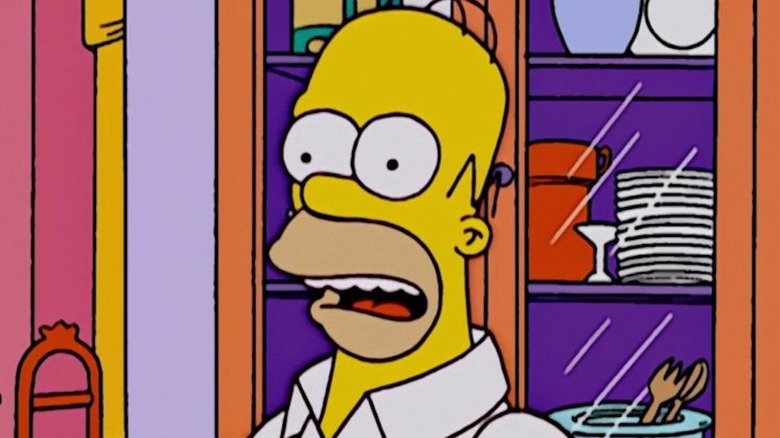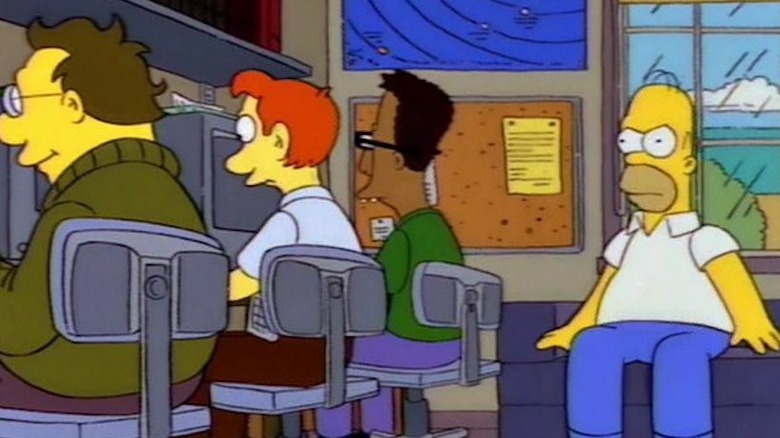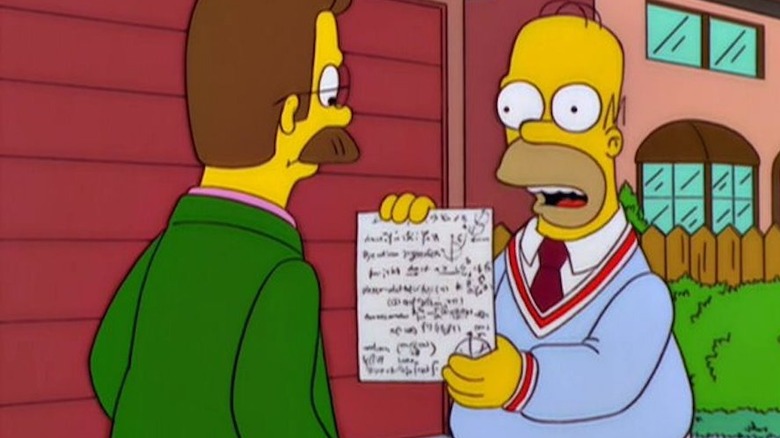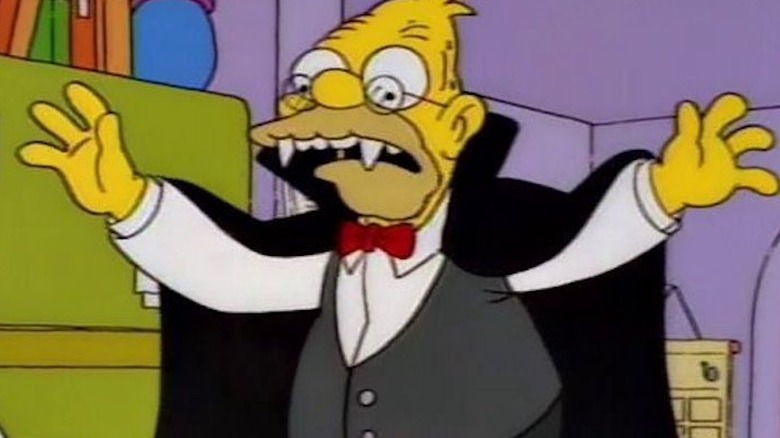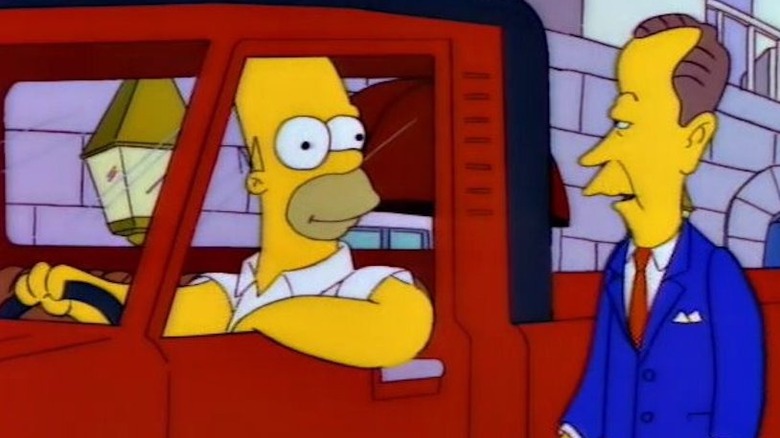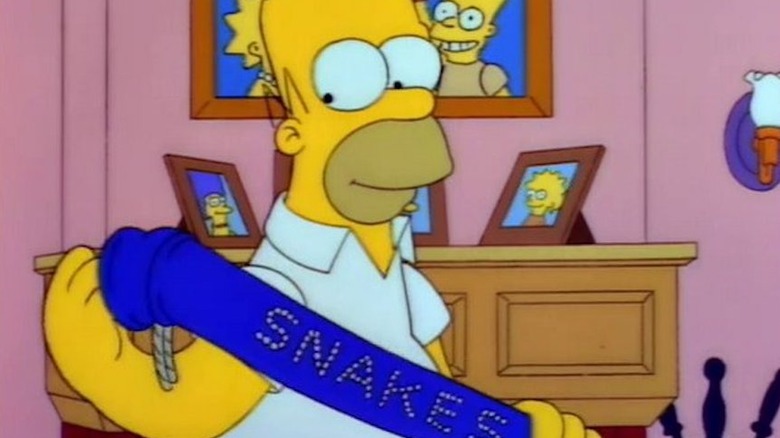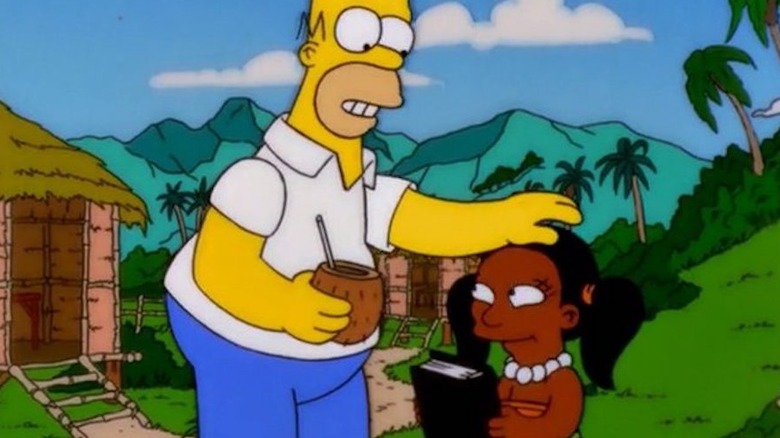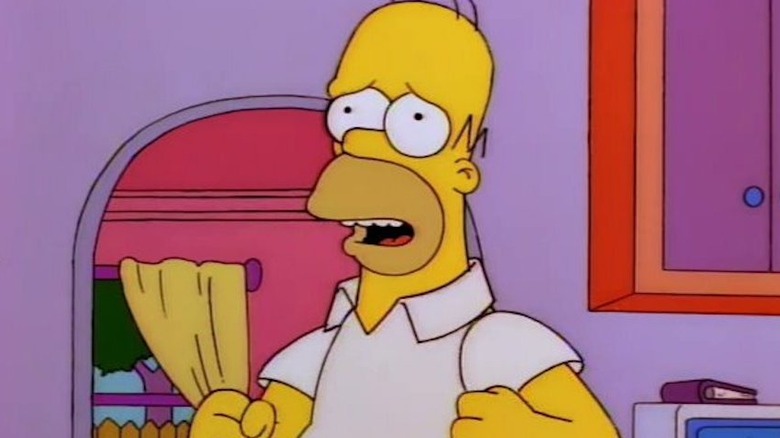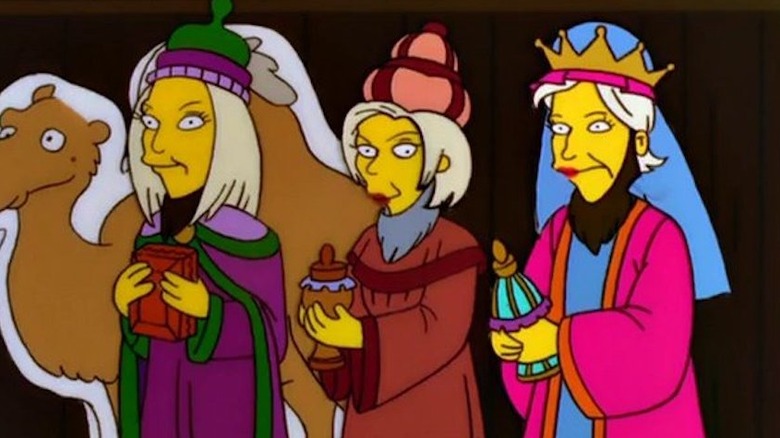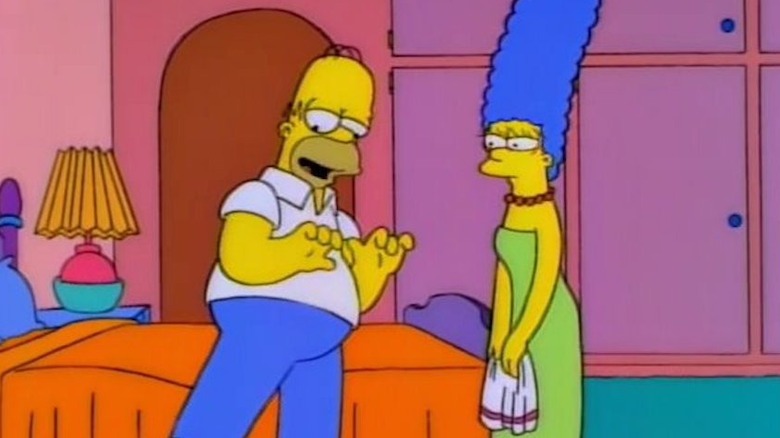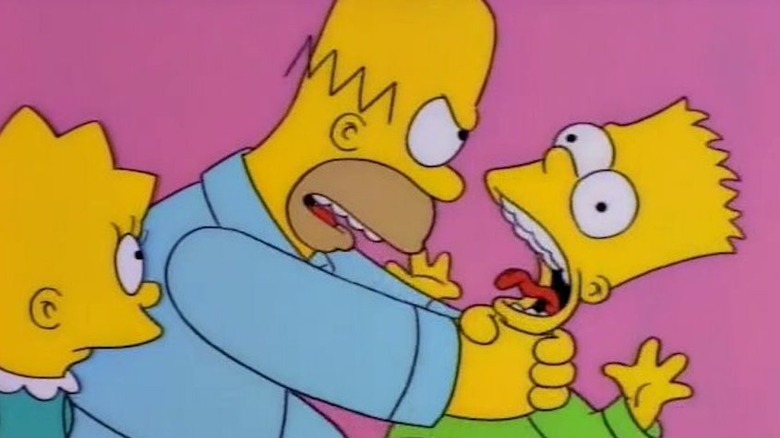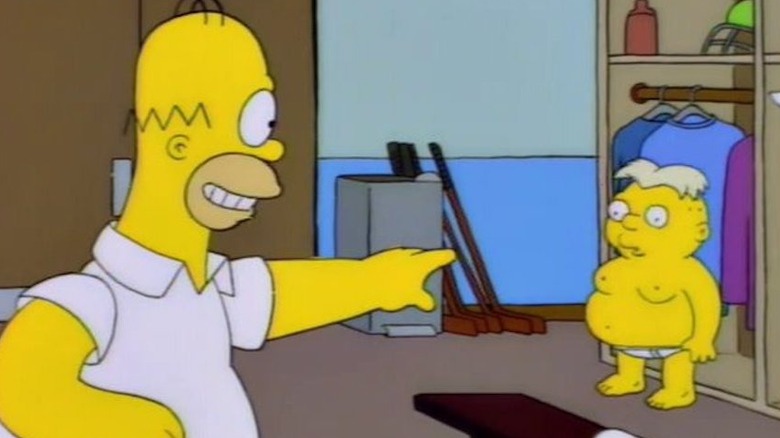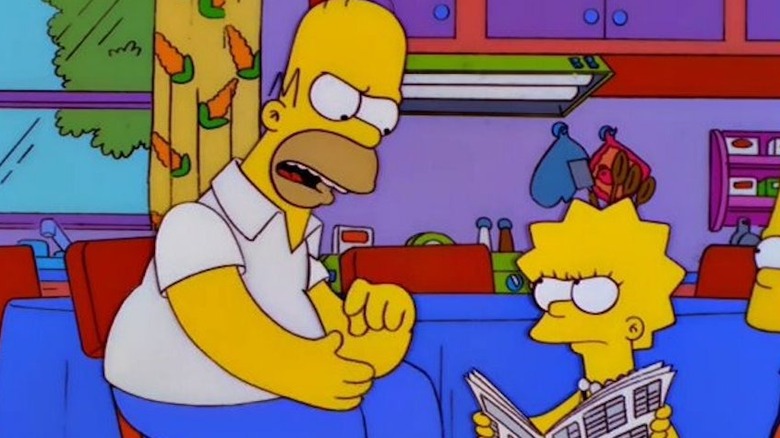Homer Simpson Quotes That Haven't Aged Well
Homer Simpson, central character of "The Simpsons" — the longest-running primetime comedy and adult animated series in American TV history — is among the most well-known and beloved fictional people of all time. That's in spite of characteristics that would make him not so lovable in real life: He's selfish, crude, rude, lazy, dumb, and proud of it. Homer also has no filter. He's the kind of person who says out loud "what other people are thinking," but that's not necessarily true — some ridiculously untrue truisms and ill-advised wisdom come out of his big yellow mouth, like "Never try."
"The Simpsons" is a comedy, so Homer is often the butt of the joke. He's eminently quotable because he frequently says such wild absurdities. However, "The Simpsons" has been on the air for so long — more than 30 years at this point — that, due to changing cultural norms and social exceptions, some of Homer's especially blunt words have, from a 2020s point of view, veered from irreverence into tackiness. Here are some memorable Homer Simpson lines that probably wouldn't make it onto TV today.
When Homer announced his intent to bully
"The Simpsons" has made great efforts over its many seasons to paint Homer Simpson as completely delusional. One sequence shows him remembering a meeting in which he's muscle-bound and seated next to a bearded baby and a gentleman alligator. A flashback to high school shows a girl sarcastically telling Homer he's cool, and he takes it at face value, even though he's really an anonymous loser. Despite all evidence to the contrary, Homer plowed into adulthood, believing himself to be a popular, athletic type. He quickly re-assumes that identity in full when he enrolls at Springfield University in the Season Five episode "Homer Goes to College." He makes Marge fully aware of his plan to push others around. "There are two types of college students: jocks and nerds. As a jock, it is my duty to give nerds a hard time."
Since this episode aired, the idea that this is just the way school was, that some people are athletes and others geeks, and that the former has the right to push the others around and they just have to accept it, has been thoroughly rejected. The anti-bullying movement renders Homer's words and actions irrelevant and irresponsible to a modern audience.
When Homer got smart and took on religion
In the Season 12 episode "HOMR," Homer Simpson grows profoundly intelligent after the removal of the cause of his stupidity: a crayon he shoved in his brain as a child. On fire with curiosity, he voluntarily writes up an analysis and safety report of his workplace, the Springfield Nuclear Power Plant, and gets the place shut down. He uses his newly acquired gift to tackle some economic issues and uncover the nature of the universe. Homer stops neighbor Ned Flanders and tells him, "I was working on a flat tax proposal and I accidentally proved there's no god."
"HOMR" aired in 2001, not too long after a peak in interest and discussion of overhauling the United States' complicated tax code and replacing it with a flat tax, so that all Americans would pay the same percentage of their income to the government. Such an idea was the focus of Steve Forbes' 1996 presidential campaign. It's a reference that's dated very much to the era in which this episode of "The Simpsons" originally ran, and few younger viewers would know what Homer is talking about if included in a 2020s episode. The other part of the quote — that Homer proved the nonexistence of God (much to the panic of pious Ned Flanders) — is too cruel for "The Simpsons" of the 2020s, which routinely produces episodes praising the role of faith in modern life.
When Homer used a word that's no longer utterable
Many of Homer Simpson's most memorable, funniest lines are of a similar ilk: an opinion or half-truth proudly and emphatically stated as if it were stone-cold and infallible. To whit: "Roads are just a suggestion, Marge, like pants," and, "A gun is not a weapon, it's a tool, like a hammer or a screwdriver or an alligator." They provide a laugh as well as insight into how Homer thinks and manages to operate in the modern, adult world.
Homer's musings ground the non-canonical "Treehouse of Horror" Halloween episodes of "The Simpsons" in the show's semblance of reality. In the Season Five special, Homer tells a worried Lisa, "Vampires are make-believe. Just like elves, gremlins, and Eskimos." Technically, and inadvertently, Homer is actually correct — none of those things are real. That E-word is now considered a slur, used as an umbrella term for a person from one of the many ethnic and cultural groups native to Alaska and northern Canada. Because English is constantly evolving along with the society that speaks it, the preferred term is now Inuit, as many northern peoples are from that lineage.
When Homer promised to murder protesters
Homer Simpson often indulges in elaborate fantasies. In the 1992 episode "Mr. Plow," he dreams of using his brand-new snowplow to be what he thinks is a real American hero and help out the president during a matter of national security. "Homer, I've got to sneak these valuable artworks out of the White House, but I can't get out of my driveway because of these protesters!" President George Bush complains to Homer. His firm response: "Mr. President, those young people are about to get a dose of reality." Homer then clears a path for the president by driving through the screaming crowd, effectively running over, striking, and killing numerous protesters.
This bit isn't so funny after it actually happened in reality, several times over. Killing protesters by running them over with a snowplow isn't a laughing matter after numerous incidents in which somebody drove a vehicle through a peaceful demonstration with malicious intent, or dispersed a group through similarly hostile means. Life imitated "The Simpsons" in 2017, when James Alex Fields drove through an anti-white nationalism rally in Charlottesville, Virginia (he was later sentenced on federal hate crime charges).
When Homer participated in animal abuse
Innuendo is a hallmark of edgy entertainment. It's intelligent enough for adults but, for all intents and purposes, still family-friendly. "The Simpsons" makes many euphemistic references to sexuality — for example, Homer and Marge never discuss "making love" when the kids are in earshot, but they do talk about "snuggling." Homer is a man of healthy and hefty appetites in all things that bring him pleasure, so he's bound to make a subtle and crude comment now and then.
He probably can no longer make one in the kind of context he does in the 1993 episode "Whacking Day." That two-meaning title is supposed to sound a little dirty, but it refers to the name of the Springfield tradition of chasing snakes to the middle of town and then clubbing them to death with treasured whacking sticks. Before the big event, Homer pulls out his trusty implement of reptile death and asks Marge, "Should I whack slow or fast?" "Slow, then fast," she purrs back, making sure everyone in the audience old enough to get the joke did. It's just that Homer is going to use that stick to beat an animal to death, which isn't a comedic conceit in the 2020s as much as it is terrifying, violent, and cruel.
When Homer called a child Lisa Junior
In the 2000 episode "Missionary: Impossible," Homer flees the United States and goes to a South Pacific island sanctuary to avoid the angry mob of PBS personalities demanding the $10,000 pledge he had no intention of paying. Posing as a missionary, Homer wreaks havoc on the lives and culture of the island's indigenous community. One of the first people he meets is a young girl who introduces herself as Oovilu-Eeoo-Kitana-Wanjay. Dressing almost identically to Lisa Simpson in a reddish dress and pearly necklace (and also voiced by Yeardley Smith), Homer decides aloud, "I'm gonna call you Lisa Junior."
Twenty years later, this whole scene could be considered problematic. In addition to using a white actor to voice a character of color (a practice "The Simpsons" has since ended), Homer's quip smacks of cultural erasure and disrespect. Yes, he looks like his typical dumb jerk self because he can't or won't remember someone's actual name, but it's still dicey.
When Homer shared some outmoded opinions about the LGBT community
In the 1997 episode "Homer's Phobia," Homer makes friends with John, a man he doesn't at first realize is gay. Once he realizes John's identity, Homer becomes paranoid that the culture at large will somehow make Bart develop an attraction to men. It's a lesson in tolerance that shows the idiocy of prejudice and paints Homer as a boorish, hateful jerk. This was satire that took a stand in the late 1990s, when LGBT individuals didn't enjoy much mainstream acceptance. There were few self-identifying queer characters on television and same-sex marriage wasn't legal anywhere in the U.S.
Still, the episode is a reflection of its time. LGBT people were still seen as "other," and their depiction traded in cliches. Some lines from "Homer's Phobia," even though they serve to paint Homer in a bad light, could be perceived as tacky or tasteless 20 years later. For example, Homer tells Marge that he feels betrayed that John didn't fit the outdated stereotype of a gay man: "I like my beer cold, my TV loud, and my homosexuals flaming." Homer also laments what the gay community has taken from him, namely names: "They ruined all our best names, like Bruce and Lance and Julian." Homer's bigoted suppositions probably wouldn't fly today, even in an episode that means well overall.
When Homer insulted a popular musician
In the 2002 "The Simpsons" episode "The Great Louse Detective," Homer Simpson nearly receives recompense for all of his numerous sins against the world and the people who live in it. He and his family even enlist the help of Bart's would-be murderer, Sideshow Bob, to help them determine who is trying to kill Homer. When asked to name those who may wish him dead, Homer replies, "Well, there's Mr. Burns, Fat Tony, the Emperor of Japan, ex-President Bush," as well as "PBS, Stephen Hawking, the fat little Dixie Chick."
No TV show in the 2020s could have a character so bluntly and derisively refer to someone as "the fat little" something or other. It's a mean, nasty assessment of a person's physical appearance. Amazingly, the Dixie Chicks (all three of them) appeared on "The Simpsons" six years later, voicing themselves. At the time, they were still known by that moniker. In 2020, amid a cultural reckoning with and purging of racially insensitive terms and practices, the group changed its name to just The Chicks, removing a word with Confederate and slavery-era connotations.
When Homer admitted to wearing women's underwear
"The Springfield Connection" is a 1995 episode of "The Simpsons" in which Marge, after chasing down and subduing a Three-Card Monte scammer, joins the Springfield Police Department. While it initially provides her with both thrills and a sense of purpose outside of raising a family, Homer can't stand his wife's chosen new profession because it threatens his masculinity. "Marge, you being a cop makes you the man!" he explains. "Which makes me the woman — and I have no interest in that, besides occasionally wearing the underwear, which as we discussed, is strictly a comfort thing."
The idea of Homer wearing women's underwear was probably pretty edgy at the time the episode aired, but in recent years, after the expansion and softening of gender roles and a reconsideration of what are "men" things and "women" things, it loses some of its luster. If anything, it's no longer a joke that macho Homer wears feminine, comfortable undergarments, but more of the revelation of a trait, a small bit of character building. Similar sentiments can be derived from Homer's unease with Marge becoming a police officer, which he thinks is a traditionally male profession. He's stuck in this distant past (from a 2020 point of view) where men did some jobs and women did others.
When Homer gave tips on choking Bart
The 1997 "The Simpsons" episode "Miracle on Evergreen Terrace" is a rather dark holiday installment. Bart, unwilling to wait until Christmas morning to open his presents, sneaks down early to play and accidentally burns down the tree and all the gifts under it in the process. He then tells the family a burglar stole everything, prompting a Springfield-wide drive to save the Simpson family's holiday. Bart finally admits the truth to his family, and regular "Simpsons" viewers would assume that this is when Homer would jump up and strangle Bart — his shockingly violent and far-too-common reaction to any bit of his son's misbehavior, big or small.
Instead, It's Lisa who chokes out Bart, demonstrating how the "cycle of abuse" continues, and that kids often learn how to act by watching their parents. However, Homer stops Lisa from killing Bart, because, her "hands are too weak." He then takes over the strangulation of his son. Homer uttered "Why you little..." before choking Bart until his eyes bulged out of his skull so many times that "The Simpsons" called itself out for this alarming and probably unconscionable act in the 2000 fake making-of episode "Behind the Laughter." Homer calls his stranglehold "a deplorable act of child abuse" that evolved into "one of our most beloved running gags."
When Homer was mean to overweight people
Homer Simpson, an overweight man himself — who once tried to gain more weight so he could qualify for a disability exception and work from home — has very little tolerance or sympathy for other heavyset people. In the 1997 "Mary Poppins"-skewering episode "Simpsoncalifragilisticexpiala(Annoyed Grunt)cious," he interrupts a song about what his family needs out of a nanny by proclaiming that he'll hire "no fat chicks," a sentiment he literally wears on a T-shirt in the 1993 episode "Marge on the Lam." Not only are the words derisive, but they're sexist, too — Homer specifically doesn't want to ever be around women with whom he considers to be a little bit heftier than he'd prefer, and he calls them "chicks," too, which is no longer acceptable.
Homer's attitude toward non-thin people extends to children, even taking on the form of bullying. In the Season Six episode "Lisa on Ice," he barges into the locker room to warn his daughter's hockey team against bullying her, only for him to catch the sight of doughy exchange student Uter. "Look, that kid's got bosoms!" Homer cheerfully cries out. "Who's got a wet towel?" Homer then chases the poor little guy around with that towel, even calling him a "butterball."
When Homer debated the definition of a fair
Homer Simpson has very staunch, incontrovertible opinions about most things, up to and including that of which he was little knowledge. He's liable to make grand pronouncements like they're well-researched thoughts or universal truths. Case in point: In the Season 10 episode "Make Room for Lisa," Lisa is searching for an activity for her and Homer to occupy a Saturday and she suggests a book fair. Homer, apparently burned before by having to attend an event that involved education and books — two things to which he is strongly opposed — nixes that suggestion. "I'm not falling for that again," he says. "If it doesn't have Siamese twins in a jar, it is not a fair."
Homer thus took his statement from one that made him look like an uncultured, semi-literate buffoon into one that made him look a little racist and behind the times. The original "Siamese twins" were Chang and Eng Bunker, born in Siam (now Thailand) and paraded around the world as a fair, or sideshow, attraction in the 19th century. Nowadays, "Siamese twins" is a derogatory reference — conjoined twins is the preferred term these days — and the era of fairs featuring human beings (or their preserved remains) on display has long since passed.
